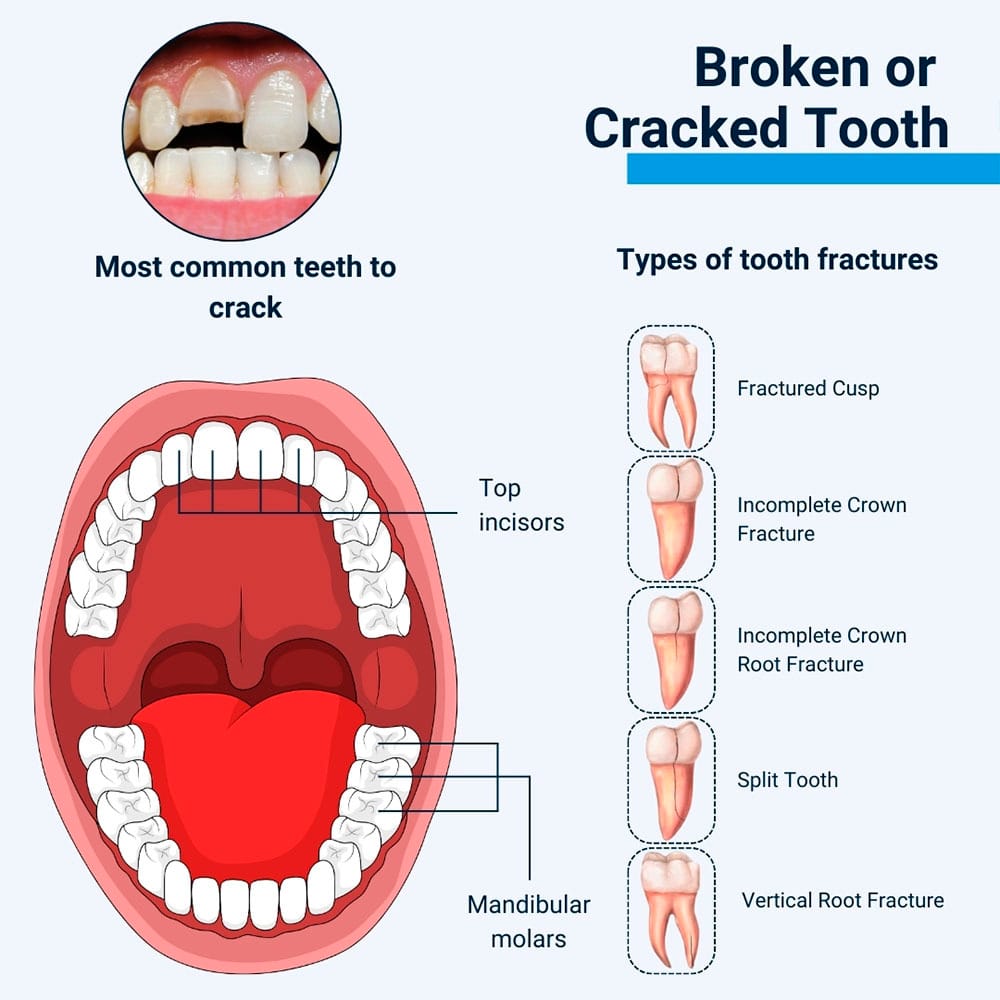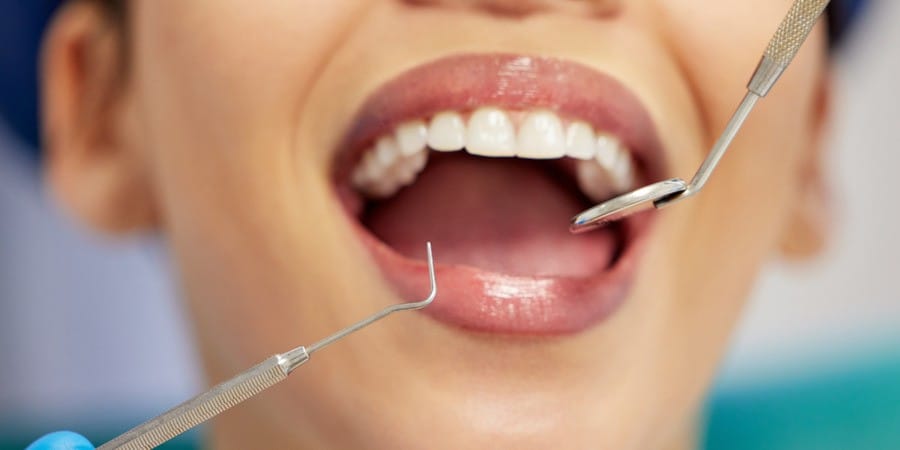Understanding a Cracked or Broken Tooth
Any of your teeth can break or become cracked, but this issue most commonly affects your upper front teeth, as they are more vulnerable to damage. Lower back teeth can also be affected, as they endure significant force when you bite and chew.
Pain from a broken or cracked tooth can make eating and daily activities difficult, and sometimes nearly impossible. Fortunately, our experienced dentists in Franklin Square are ready to manage urgent dental situations, including cracked teeth.

What Can Cause a Cracked Tooth?
The enamel that protects your teeth is made of hard, mineralized tissue. It can withstand significant pressure, but its strength is not unlimited.
Teeth can break or crack in the following situations:
- Injuries or blows to the face – falls, sports injuries, or accidents.
- Hard or tough foods – nuts, ice pops, hard candies, or ice.
- Bruxism (teeth grinding) – frequent or strong clenching of the teeth, especially at night.
- Weak teeth due to decay or restorations – large fillings or brittle teeth after treatment.
- Thermal shock – sudden changes in mouth temperature (hot/cold).
- Age-related changes and enamel wear – teeth become more brittle over time.
- Incorrect use of teeth – opening bottles, biting threads, or other objects.
It is important to seek professional dental treatment for a broken or cracked tooth, as it could become infected. There is a risk of developing a tooth abscess, which is much more serious. Other symptoms may include bad breath, persistent tooth pain, fever, and swollen lymph nodes.
What Are the Different Types of Cracked Teeth?
Teeth can break or crack in various ways listed below.
- A vertical crack that extends from the biting or chewing surface to the gumline. Sometimes, the crack can extend into the tooth root.
- Hairline cracks are small cracks in tooth enamel. These don’t usually cause any problems and may not require treatment.
- A split tooth occurs when a tooth has fractured into two halves and can extend below the gumline.
- A vertical tooth root fracture begins below the gumline, moving toward a tooth’s biting or chewing surface. This damage may cause no symptoms unless the tooth pulp becomes infected or inflamed.
- A fractured tooth cusp can occur near a large filling. It isn’t usually painful.
What Are the Signs of a Cracked Tooth?
A broken or cracked tooth doesn’t always cause any symptoms unless you notice a loose piece of tooth in your mouth after biting down.
However, possible symptoms can include:
- Increased tooth sensitivity to temperature changes or when eating anything sweet.
- Tooth pain when biting down on the affected tooth.
- Swollen gums around the tooth.
It is important to get professional dental treatment for a broken or cracked tooth, as the tooth could become infected.
There is a risk you could develop a tooth abscess that is much more serious. You may notice other symptoms in this situation, including bad breath, continual tooth pain, fever, and swollen lymph nodes.
What to Do if You Have a Chipped or Broken Tooth?
If possible, save the broken piece of the tooth and place it in a thoroughly cleaned container filled with saline solution or milk. Bring the container with you to the dentist. This is especially important if you or your child has broken a front tooth.
You can also:
- Relieve pain with over-the-counter medication until you can see a dentist.
- If the bleeding does not stop, apply pressure to the outside of the gums at 10-minute intervals.
- Rinse your mouth with salt water to clean the affected area.
- Place a piece of chewed sugar-free gum on the exposed nerve or jagged edge.
- Reduce swelling by applying a cold compress to your jaw.
Until the broken tooth is treated, eat only liquids or soft foods. Pain from a broken or cracked tooth can make eating and daily activities difficult, and sometimes nearly impossible.
Do not throw away the broken piece; in most cases, it can be successfully restored!
Treatment Options for a Broken Tooth
When you see our dentist, we can examine the tooth and ask about your symptoms. We will need to assess any cracks carefully and may take digital dental X-rays to examine tooth fractures.
Once we have all this information, we can discuss suitable treatment options.
These can include:
-
Dental Bonding and Contouring
When a break or fracture is minor, we may be able to mend it with dental bonding, a process that uses tooth-colored composite resin to restore the tooth. The composite resin is applied directly to the tooth, hardened, shaped, and polished.
We may use this treatment in conjunction with dental bonding. Dental contouring is a process where we carefully smooth out rough edges, removing a minimal amount of tooth enamel to recontour a tooth nicely.
-
Dental Veneers
If you have cracked or chipped a front tooth, mending it with a porcelain veneer may be possible. A dental veneer is a custom-made porcelain shell that fits over a tooth’s front surface, restoring its strength, structure, and appearance.
-
Dental Crown
When the damage is more severe, covering your tooth entirely with a dental crown may be necessary. We can fabricate beautiful dental crowns made entirely from porcelain that fit precisely, protecting the tooth underneath from further damage and decay.
-
Crown Lengthening
A tooth can break off right near the gum line; when this occurs, there may not be enough tooth visible to restore it with a dental crown. In this case, we might suggest crown lengthening to expose more of the tooth and create enough structure to fit a dental crown.
-
Root Canal Therapy
If the damage to your tooth has reached your tooth pulp, we will need to use root canal therapy to remove it. Removing the tooth pulp will get rid of all infection and inflammation. Afterward, we can restore the tooth with a permanent filling and cover it with a dental crown.
-
Tooth Removal
Sometimes, a crack or fracture is too severe to save the tooth. This may be the case if the tooth has split into two parts, right through the tooth root, in which case we would have no choice but to remove it. We can discuss how best to replace it before your tooth extraction.
Can I Prevent Teeth from Becoming Fractured or Broken?
You may not be able to prevent all damage to your teeth, but you can reduce your risk by following the simple guidelines below.
Follow a Good Oral Care Routine
Ensure you brush and floss regularly and have regular dental exams and hygiene appointments. During your dental exam, we can detect small cracks in your teeth and provide any treatment required at an earlier stage, helping preserve and protect them.
Wear a Mouthguard
If you play sports where you can take a blow to the mouth, get a custom-fitted mouthguard. It is designed to protect your teeth and jaws, reducing the risk of breaks and fractures.
You should also get a mouthguard if you have bruxism. We can diagnose this condition during regular dental exams and provide an appropriate custom-made night splint.
Don’t Use Your Teeth as Tools
Avoid biting your nails or using your teeth to open packaging. It’s also best to avoid chewing on hard items that could crack or chip your teeth.
Do you have any questions about broken or cracked tooth repair in Franklin Square? For more information or to schedule an appointment with our experienced broken teeth dentist, contact our clinic today to consult with Dr. Kelly and Dr. Rayhan.

